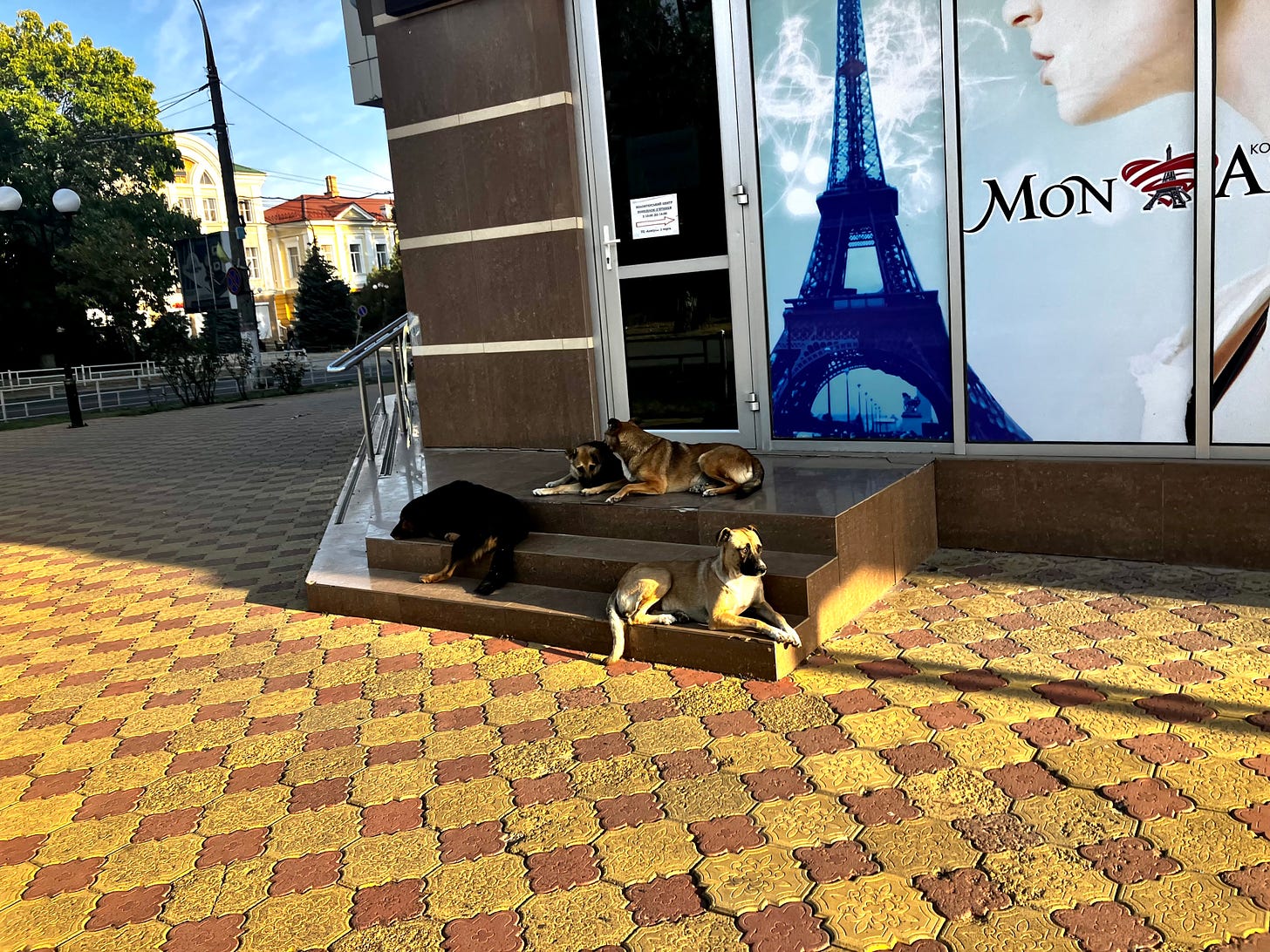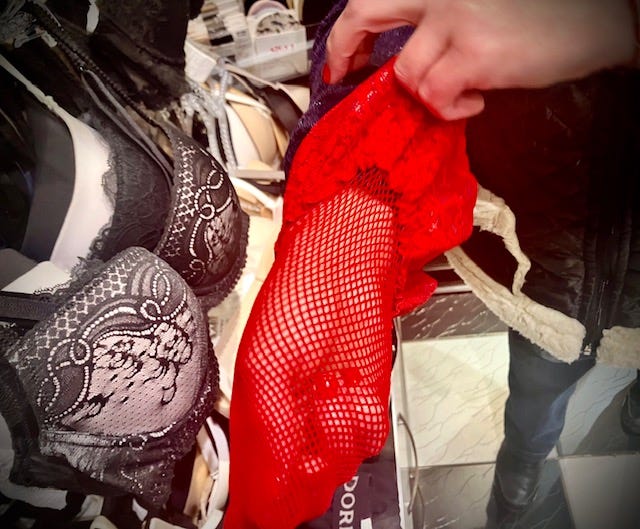Kherson, Apocalypse
As the second anniversary of Russia's invasion of Ukraine approaches, Zarina Zabrisky, one of the only foreign correspondents in Kherson, shares her impressions of life in a war zone.
Apokálypsis: “lifting of the veil”
When a ballistic missile hits, the whole city jumps: everyone’s walls tremble, all doors burst open and each eardrum pops. People in Kherson rarely speak in singular pronouns.
“We are being bombed. Russia ruins our homes. They kill us.”
Yet, when a cluster munition hits right underneath your apartment, you just stare into the black empty shell alone. In Kherson, a frontline city, war, a great equalizer, impregnates your body. Kherson becomes you; you become Kherson. The Dnipro River divides everyone’s world in two: life and death. Every breath can be the last one. The familiar and illusive comfort of the civilization dissipates. The sense of control and agency are swept away. You are living a naked life—covers, layers, drapes, blinds removed, stripped.
In Kherson, all your senses grow sharper. In a distorted space-and-time blur, death is close, omnipresent, and palpable, a mad neighbor across the river. We smell it, hear it, see it, touch it, taste it, at all times. We are being hunted; we need to survive. We become akin to wild animals.
And for animals, Kherson is a feast—literally. Dogs lick human blood and brains off the ground. Packs of wild dogs attack people and kill cats. Dogs, people, and cats all get killed by shrapnel. One night in December, I reported from the shelling site: a man and a dog strewn next to each other. I recognized the dog’s wet yellow fur: it had barked at me as I walked past the yard about a week before the shelling. Crows were already gathering for dinner.
Rats the size of cats lurk behind dumpsters. Volodymyr lives by the river in a giant mansion and spends his days delivering food to those in need. He lost his construction business during the war. His family is abroad. At night, he catches mice. 52 mice in two months. Next door, in an empty palace-like house, the floor is completely covered by mice, like a living carpet.
“A horror movie,” said Volodymyr. “They smell food.”
Smells are different in Kherson—sharper, more pungent, earthy, they are an assault on the human olfactory system. In the fall, the scent of dry leaves morphs into a decaying wet odor. Between the foliage, rusted torn pieces of Russian missiles bloom, jagged petals shooting up. The flowers of evil. Few janitors in bulletproof vests clean the streets, but the paths are drowning in thick slush. Dead pigeons rot between broken glass on the pavement, a waft of rot twirling through the air. The bins are overflowing with garbage; old people are rummaging through them and the stale musky smell stays in the air. This past December, Russians hit an ammonia container at an industrial enterprise. The leak was minor, but I felt the odd scent and burning taste in my mouth throughout the afternoon, wondering if it was somatic.
After an explosion, the burnt scent sets in for a while. For a reporter, it is bliss: in the urban setting, finding the “hits” between high rises is hard, sometimes impossible. You get out of the car and sniff the air, like a dog. Volodymyr calls the smell scene “multi-layered”—a twist on filo-and-custard Ukrainian cake. He and all his friends who lived in Kherson during the occupation claim that the smells in the city have improved. In the summer of 2022, the Russian occupational troops burned the bodies of their dead soldiers at the city dump, according to multiple reports. The stench of decomposing flesh, burnt hair, and skin mixed with the odor of chemicals they used to pour over the bodies and spread over the city. Opening windows during the heat waves was not an option. A year later, in the summer of 2023, the odor of death covered the city again. The Russians blew up the Nova Kakhovka hydropower plant dam. The flood led to water contamination and sea pollution as the Dnipro River flooded the Kherson region, flushing away cemeteries, sewage systems, and farms. A deadly mix of unexploded mines, chemicals, sewage, animal and human remains, and trees washed into the Dnipro and the Black Sea. Death permeated everything: air, water, and souls.
Death mostly falls from the sky. Day and night, at dawn or twilight, air raid sirens howl, signaling attacks: missiles, aerial bombs, and drones. There is no schedule.
Aerial bombs, dropped by dozens in the suburbs, hit the ground with a bellowing sound. The low, sonorous din follows, resonating over the river. The enemy on the other side of the Dnipro answers with more fire.
“Shahid” drones are nicknamed “mopeds”: they whizz and buzz. The disgusting racket mixes with the dry claps of automatic guns the Ukrainian air defense uses to shoot the “mopeds” down. In December, a drone screeched and shrieked by my window at night and, in my half-sleep, I saw a wicked witch on a dilapidated motorized mop rattling by at a dizzying speed. Such flights always end with a bang of explosion, glass jingling and crackling against the ground, dogs barking, and crows cawing.
Not all attacks come with a warning. Artillery fire is not announced. The Russian troops are too close to the city and the Ukrainian air defense cannot intercept and disarm the shells. The artillery attack is a three-note tune: a distant boom, a long, thin whistle, and rumbling explosions. Mortars, tanks, and “Grads” all have different voices, wailing, shrilling, and grumbling like an orchestra from hell.
The locals nicknamed the polyphonic noise “Vietnam.” As you walk outside, you step into the shattered glass, adding the grinding sound of chalk on the blackboard as your own cringing note to the cacophony.
When it gets dead quiet between the bursts, you start hearing your pulse and heartbeat. If such silence lingers, anxiety sets in: “Armageddon” is on the way, locals say. Ivan, a former barista-cum-partisan, confessed he could not fall asleep without explosions. Oksana, a grandmother of five, is alarmed if she doesn’t hear attacks for a while: “Just as when kids get quiet, you know they are up to no good.”
One night, in a dark kitchen with curtains drawn, my fellow writers Paul Conroy, George Llewelyn, and I struggled to find words to adequately describe the ruckus outside. Clichés like “thuds punctuate” failed to come even close. The issue might have been not our exhausted vocabulary but the indescribable nature of these sounds. The closest I came to depicting the polyphonic disharmony is via a visual image. Leon Bakst’s painting, called Terror Antiquus—“Ancient Horror”—is an apocalyptic landscape of archaic, violent chaos, with a silent deity presiding over the sounds of death. Khersonians would shrug off the pretentious symbolism. Asked how he managed to play amidst the attack, a silver-bearded street musician drummed a happy tune to the ululations of a siren, grinned, and said, “We are Kherson. Invincible.”
What you can’t smell or hear, you see. Once you see a dead body, you can’t unsee it. You keep seeing the waxy sharpened nose and twisted neck in your head each time you pass the same corner walking home from a grocery store.
After 5 pm, solid darkness settles in. The light camouflage regime means no street lights. By 8 pm—curfew—it feels like 3 am. Not a glimmer of light downtown. For months, we have been watching the windows turning dark in surrounding buildings, one by one. A few residents were killed. Others left. Those still around drew drapes down and for a good reason. Fog, darkness, and shadows weave into a curtain, a barrier—but when it shifts, you stare into the abyss. One night in October, I stepped out to the balcony to record the sounds of explosions—“Vietnam”—and stared into the red eye of a drone. It glared back at me, the evil eye of an ancient bird or a Terminator robot. I dove down. So did the drone.
Spotting a drone saves your life: drones drop explosives. My colleague Paul Conroy escaped by speeding up on the roundabout: the drone missed his car by inches. Volodymyr prefers driving in the fog to cheat the drones. Vision turns into a critical survival tool, too.
One happy sense in Kherson is taste. Armageddon or not, the Khersonians feast. There is something Rabelaisian about the Khersonian character: bigger than life, hedonistic, abundant in anything from oak-barrel moonshine, homemade wine and pickled watermelons to scatological jokes, mountains of fried meat and fountains of drinks. Ancient Greeks would be proud of Kherson.
Cafes and bakeries still open serve fiery borscht, gentle syrnyki—fluffy cottage cheese clouds of bliss melting in your mouth, juicy shawarmas and wrap with smooth sauces, pesto pasta, and freshly made sushi. The front doors are covered with cardboard; missiles and shells hit the street, but inside, the aisles explode in carnivalesque colors, texture, and holiday lights.
The central grocery store’s deli overpours with steaming and bubbling burritos, lasagna, pizzas, golden cheeses, and marble hams. The fruit aisle features dragonfruit, cactus leaves, papaya, and the symbol of Kherson—watermelon. In October, Halloween pumpkins and witches compete with the “Grads” and “mopeds” outside. In December, Christmas trees glitter and twinkle, Jingle Bells and Baby, it’s Cold Outside tunes playing softly. The variety of Advent calendars would make any Western store pale with envy. Smiling sales ladies remember you prefer freshly-baked rye bread over baguettes and insist you opt for sesame buns instead. After a ballistic missile attack, Katya, a strawberry-blonde cashier, joked that the management should install a cooler with brandy for customers—“for nerves.” Alcohol is sold strictly from 10 am to 3 pm, though, at the stores and a few bars still open, and Katya would not budge.
In a murky basement bar, a DJ plays patriotic techno and customers smoke watermelon scent hookahs, fumes whirling under the low ceiling with Alice in Wonderland incongruity. Wild mushroom soup is sprinkled with sage and from the wall, a Kherson cat in military attire grins and disappears in smoke.
The sense of touch is less obvious but it is altered, too, slowly. In summer, I felt the breath of death on my skin. As I hung out on the balcony, as usual, to record the artillery thunder, an earthshattering blast roared and rumbled by the river. A split second later, my hair ever so slightly lifted and gently fell on my lips.
Another day, after reporting from the ruins of the whole block downtown, I bumped into a teenage girl in a mini-skirt, blowing bubbles at a bus stop, laughing. The thin film stretched and played with rainbow swirls, bursting in sprinkles, and a few crystal balls floated up and soared over the singed street like transparent watermelons.
In winter, the sense of touch is often reduced to experiencing the texture of multi-layered clothes. The central heating got turned on in late November—early December and thick pajamas inside became a must. Our windows, scotch tape X-patterns on them WWII-style, stayed intact, but most windows in Kherson are broken or cracked by the shock waves.
In any weather, the heavy grip of a bulletproof vest—along with its distinct Velcro crackling—became so familiar that stepping outside without it doesn’t feel right anymore. It changes your center of gravity and reorients your spine. Unfamiliar lightness makes me anxious—just like a night without shelling.
The sense of touch turns into another survival tool. Kherson is an athletic, corporeal city. A few gyms and yoga studios run fitness training and group exercise classes amidst shelling and explosions. In a fly yoga class, Jane, always radiant and gentle, teaches women to balance off each other’s shoulders in an airy studio, trying Cirque de Soleil poses requiring not just strength but trust. Nothing clears your mind like hanging upside down from the ceiling to the sounds of heavy artillery. At a women's health practice, a tall, mermaid-like Olexandra teaches to clap palms on thighs to lower stress and rub the bare toes on the ribbed texture of the rug to the siren’s howl.
Olexandra and Jane take me to the banya, a dim steam room smelling of oak, eucalyptus, and coconut oils. They bring a venik, a mop of oak leaves, and slap each other, laughing and singing, even as the blasts never stop outside. Three other women join us and speak about sex. War changes sex, they say. Women leave. Men fight. Families split. Couples are forced to be in long-distance relationships. Gay people left. Dating options are limited to a walk under artillery fire and a movie night, interrupted by blackouts.
“Look at a local drugstore,” says Lena, a redhead with matching long nails. “Viagra, Viagra, Viagra.”
Jumping into the icy pool shocks all senses to the point of oblivion, and warm beer and dried fish waiting at the wooden table force the war out into a small, closed locker, deer horns over the oval mirror. Robust bathers of the yesteryear grin from the lavish golden frames, lobster-pink impressive bosoms, and buttocks of Titian proportion glistening.
As I go shopping for towels for the bath, I find a bedding store with an impressive stock of all things silky and lacey. The storefront is covered with cardboard; inside sensual blues are playing and Liudmila, a chatty saleswoman, tries to sell me red fishnet stockings. I buy a wonderfully fine and soft white blanket instead.
“Wrong choice. Fishnet stockings better, girl,” said Liudmila. “They might as well find you looking hot if your apartment is hit.”
And when my apartment does get hit, I stand on the balcony—my own captain’s bridge—studying the shell that failed to blow up and kill me. It is heavy, smooth, cold, and smells burnt. I am staring inside, into the impenetrable darkness at the bottom. The mini-abyss is staring back.
The sounds, smells, tastes, touches, and visions of Kherson fuse into an alive fabric. It envelopes me in a thin, clinging veil and blends into my skin, sneaking underneath, turning into a thin lining, an ethereal membrane sheathing my every cell and filling my bloodstream with war, becoming me. Then, the veil shifts, lifts, tearing me inside out, and I sense the porous boundary between being and non-being. I’m ready to sail through the liminal space between living and non-living with a newly discovered sixth sense: chuika.
A mix of intuition, gut feeling, clairvoyant power, the inflammation of the soul, chuika evolves into almost a tangible organ after a few close hits. An extension of my body and mind, something as mundane as a toe, it turns into an existential GPS. I don’t need a blanket. Flaming fishnet stockings and chuika are all I need to cross the Styx.
Zarina’s work appears in the Byline Times and the Euromaidan Press. Follow her on Twitter.
All photos by Zarina Zabrisky.












I have never been so close to what war feels like for those without a weapon in their hands. Yours is a staggering piece of literature that takes us there, Zarina. Thank you.
Stunningly Sad.